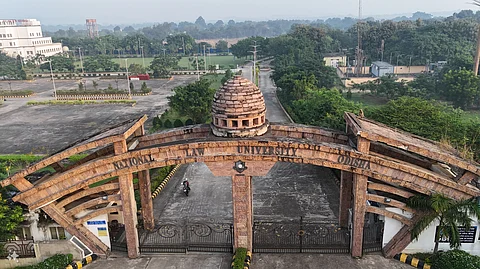
- Latest Legal News
- News
- Dealstreet
- Viewpoint
- Columns
- Interviews
- Law School
- Legal Jobs
- हिंदी
- ಕನ್ನಡ

The National Law University, Odisha (NLUO) Centre for International Trade Law (CITL) is offering a two credit certificate course on 'Introduction to WTO Jurisprudence' to spread WTO literacy.
The objectives of the course are
To impart knowledge about the basic legal framework of the WTO Agreement.
To clarify the concepts of international trade law under the WTO.
To guide through case laws how legal provisions are used and applied in disputes.
To help students analyse and evaluate the Agreements and case laws in the background of academic debates around them.
To guide students in research and writing on issues relating to international trade law.
After completing the course, a student will be able to
Identify the foundational principles of the WTO law.
Explain the framework of the WTO Agreements and in their concepts.
Critically analyse and evaluate WTO cases and the legal provisions.
Comment on trade-related issues from social, legal and developmental perspectives.
Part I: Theoretical and Organizational Background Module
Module 1: Theoretical and Historical Background
In this historical background to the creation of WTO and theories of international trade will be discussed along with a discussion about the need for governmental regulation of trade.
Module 2: The Structure of the World Trade Organization
This module examines the organizational structure of WTO and its dispute settlement mechanism that ensures compliance with trade rules.
Part II: Rules on Trade in Goods: The Three Pillars
Module 3: The First Pillar-Market Access
This module focuses on the principles of market access under WTO law, emphasizing the elimination of quantitative restrictions and binding of tariff to promote freer trade.
Module 4: Second Pillar: Non-Discrimination (Most Favoured Nation Treatment and National Treatment
Delving into principles of Most Favoured Nation (MFN) treatment, and National Treatment, this section unpacks the concept of 'like products' and how these doctrines uphold fairness in global trade.
PART III: Exceptions to the Rules on Trade in Goods and Regulation of Non-Tariff Barriers
Module 6: Policy Based Exceptions
This module examines General Exceptions under GATT and Security Exceptions that allow member states to deviate from trade obligations under specific circumstances. The focus of this module would be the flexibility within WTO Rules.
Module 7: Exceptions to Protect Particular Industries
Addressing trade remedies to shield domestic industries, this module includes anti-dumping measures, countervailing duties on subsidized imports (with a focus on fisheries subsidies), and safeguard actions in response to import surges.
Module 8: Regulation of Non-Tariff Barriers
This module examines key WTO disciplines governing non-tariff barriers with a focus on Sanitary and Phytosanitary (SPS) measures and Technical Barriers to Trade (TBT) that affect product standards and safety regulations.
Module 9: Agreement on Agriculture
Covers the WTO's agricultural trade framework, including rules on market access, domestic support, export subsidies, and the intersection of trade policy with food security concerns.
PART IV: Expanding Horizons of WTO
Module 10: Trade in Services
Explores the WTO framework for trade in services and covers the four modes of supply, specific member commitments, general obligations, permitted exceptions, and built-in agenda for future negotiations.
Module 11: Trade-Related Aspects of Intellectual Property Rights (TRIPS)
This module provides an overview of the negotiation history and guiding principles of the TRIPS Agreement detailing specific IP rights and protections and mechanisms for their administration under WTO law.
Module 12: Trade and Investment
Introduces key WTO instruments governing investment-related measures, focusing on the Agreement on Trade-Related Investment Measures (TRIMs) and the Trade Facilitation Agreement aimed at streamlining cross-border trade procedures.
The course will be taught in online mode via Google Meet. Links will be shared to the registered students.
September 15 - October 10, 2025
Note: No classes will be held between September 29 to October 5 due to Durga Puja vacation.
The course will be conducted Monday to Friday from 6:30 - 8:30 pm
Students have to submit a research paper on a given topic. The written assignment will be for 50 marks. The assignment will be given on September 15 and the submission date is October 10, 2025.
Declaration of results will be on October 30, 2025.
Successful students will be given a certificate specifying the course holds two credits.
Fee: ₹1500 per person
Guidelines for payment can be accessed here.
Last date for payment and registration: September 10, 2025.
<Sponsored by the Brand>